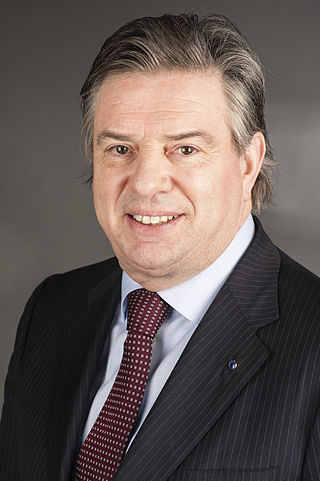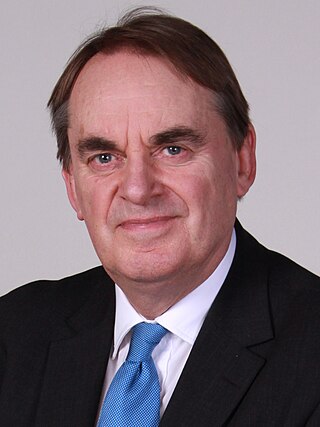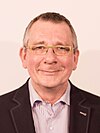
The Netherlands is a parliamentary representative democracy. A constitutional monarchy, the country is organised as a decentralised unitary state. The Netherlands can be described as a consociational state. Dutch politics and governance are characterised by a common striving for broad consensus on important issues, within both of the political community and society as a whole.
The Christian Union is a Christian democratic political party in the Netherlands. The CU is a centrist party, maintaining more progressive stances on economic, immigration and environmental issues while holding more socially conservative positions on issues such as abortion and euthanasia. The party describes itself as "social Christian".

The Reformed Political Party is a conservative Reformed Christian political party in the Netherlands. The SGP is the oldest political party in the Netherlands existing in its present form, and has been in opposition for its entire existence. Since 1925, it has won between 1.5% and 2.5% of the votes in general elections. Owing to its orthodox political ideals and its traditional role in the opposition, the party is considered a testimonial party.

Christian Union–SGP is a collaboration between the Dutch political parties Christian Union (CU) and Reformed Political Party (SGP). In some municipal elections and Provincial Council elections, the parties submit a joint list. Before the merger of the Reformed Political Alliance (GPV) and the Reformatory Political Federation (RPF) into Christian Union in 2000, these parties also participated in various combinations, including SGP/RPF/GPV. From 1984 to 2019, the parties participated jointly in the European Parliament elections.
An election of Members of the European Parliament representing Netherlands constituency for the 2004–2009 term of the European Parliament was held on 10 June 2004. It was part of the wider 2004 European election. Fifteen parties competed in a D'Hondt type election for 27 seats.
Liberalism in the Netherlands started as an anti-monarchical effort spearheaded by the Dutch statesman Thorbecke, who almost single-handedly wrote the 1848 Constitution of the Netherlands that turned the country into a constitutional monarchy.

Antonius Jozef Maria "Toine" Manders is a Dutch lawyer and politician who served as a Member of the European Parliament (MEP) in the periods 1999–2014 and 2019–2024.

The 2009 European Parliament election was held in the 27 member states of the European Union (EU) between 4 and 7 June 2009. A total of 736 Members of the European Parliament (MEPs) were elected to represent some 500 million Europeans, making these the biggest trans-national elections in history. An additional 18 observers were pre-elected.

An election of Members of the European Parliament representing Netherlands constituency for the 1999–2004 term of the European Parliament was held on 10 June 1999. It was part of the wider 1999 European election. Eleven parties competed in a D'Hondt type election for 31 seats.
An election of Members of the European Parliament representing Netherlands constituency for the 1994–1999 term of the European Parliament was held on 9 June 1994. It was part of the wider 1994 European election. Eleven parties competed in a D'Hondt type election for 31 seats.
An election for Members of the European Parliament representing Netherlands constituency for the 1989–1994 term of the European Parliament was held on 15 June 1989. It was part of the wider 1989 European election. Ten parties competed in a D'Hondt type election for 25 seats.
An election for Members of the European Parliament representing Netherlands constituency for the 1984–1989 term of the European Parliament was held on 14 June 1984. It was part of the wider 1984 European election. Nine parties competed in a D'Hondt type election for 25 seats.

The 2009 European Parliament election was the United Kingdom's component of the 2009 European Parliament election, the voting for which was held on Thursday 4 June 2009. The election was held concurrently with the 2009 local elections in England. In total, 72 Members of the European Parliament were elected from the United Kingdom using proportional representation.

The 1979 European Parliament election was a series of parliamentary elections held across all 9 European Community member states. They were the first European elections to be held, allowing citizens to elect 410 MEPs to the European Parliament, and also the first international election in history.

The Netherlands is a European Parliament constituency for elections in the European Union covering the member state of Netherlands. It is currently represented by 31 Members of the European Parliament. Until the 2009 European Parliament election, it excluded the Dutch in the Netherlands Antilles and Aruba.
The Party for Freedom is a nationalist and right-wing populist political party in the Netherlands. In the 2023 general election, it became the largest party in the House of Representatives.

The Reformed Political League was an orthodox Protestant political party in the Netherlands. The GPV is one of the predecessors of the Christian Union. The party was a testimonial party.

An election of the Members of the European Parliament from the Netherlands was held on 22 May 2014. This is the 8th time the elections have been held for the European elections in the Netherlands.
An election of the Members of the European Parliament from the Netherlands was held on 23 May 2019. It was the ninth time such an election had been held in the Netherlands. The number of Dutch seats had been set to increase from 26 to 29 following Brexit, but due to the extension of the Article 50 process in the United Kingdom, the number of seats to be elected remained at 26.


















